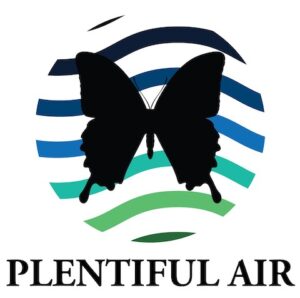A poor sleeping position, worn-out CPAP mask, or nasal congestion can increase your CPAP events per hour. CPAP events can also be increased or influenced by drinking habits, mask leak, or mask-off events.
Continuous Positive Airway Pressure (CPAP) machines are used to provide air pressure to keep airways open and prevent abnormal breathing patterns during sleep, a common product of sleep apnea. Ideally, fewer CPAP events indicate an effective therapy. Unfortunately, however, a few sleep apnea patients experience a rise in their CPAP events per hour.
Because CPAP therapy is meant to decrease your events per hour and improve sleep quality by keeping your airway open, more per-hour events are a red flag. It indicates your CPAP device isn’t performing its job. This article will give you an insight into why the events are increasing and provide possible solutions to help you make the most of your therapy.
- CPAP events can increase when the mask is old, or there is a mask leak or mask-off event.
- Poor sleeping position, nasal congestion and drinking can also increase the number of events per hour.
- An AHI (Apnea-Hypopnea index) number less than 5 is ideal when using CPAP, this indicates you are having 5 or less events per hour.
What Is CPAP and How Does It Work?
CPAP is a treatment method for people who suffer from sleep apnea. These machines use mild air pressure to keep your airways open. It aims to ensure your airway doesn’t collapse as you breathe during sleep.
It is usually obstructive sleep apnea that compromises the air delivery to your lungs, and doctors may recommend CPAP as a treatment method to these patients. The therapy is also used for babies without fully developed lungs and are common place in Neonatal intensive care units (NICUs) and Special Care Nurseries. The CPAP machine blows air into an infant’s nose, inflating their lungs.
CPAP therapy usually comprises these components:
- A mask worn over your nose and mouth, only nose, or prongs adjusted into your nose
- A tube that attaches the mask to the system’s motor
- The motor blowing the air into the tube, towards your lungs
Benefits
How long you’ll undergo CPAP therapy depends on the severity of your sleep apnea. However, regardless of the treatment period, you’ll notice a significant change in the end. CPAP therapy may help you:
- Reduce or eliminate excessive or loud snoring (that may obstruct your sleep)
- Keep your airway open as you doze off
- Improve your sleep quality
- Lower high blood pressure
- Decrease or eradicate daytime sleepiness (a typical symptom associated with sleep apnea)
Side Effects
It is possible to experience different side effects during CPAP therapy. The common ones include the following:
- Runny or stuffy nose when wearing a CPAP mask
- Feeling claustrophobia or having mask anxiety
However, these side effects aren’t severe and can be avoided by fitting your mask appropriately. For instance, those dealing with mask anxiety or claustrophobia can opt for a lightweight mask or prongs, and heat humidification of the CPAP air helps alleviate any nasal congestion.
Most CPAP machines have a heated humidifier. So, make sure you get the most out of yours and use it regularly.
Why Have Your CPAP Events Increased Per Hour?
Before we discuss why CPAP events per hour may go up, it is crucial to understand what CPAP events are. An event per hour refers to the number of breathing events – hypopneas or apneas – you encounter in an hour.
Those with apnea stop breathing for 10 seconds or longer due to a blocked airway. At this point, a CPAP machine takes over and ensures the patient breathes continuously during this time. It tracks the number of times the events take place.
So, when you wake up, you can see the total number of events as the Apnea-Hypopnea Index (AHI) score. Ideally, the number of events per hour must be less than 5 (considered normal sleep). However, this varies depending on the severity of your condition.
If you notice a rise in the CPAP events per hour, it signifies an underlying problem. Maybe the mask is worn out, or the device isn’t working properly. Whatever the case, your therapy is being compromised, and you must not sleep on it but rather address the issue immediately.
Warped CPAP Mask
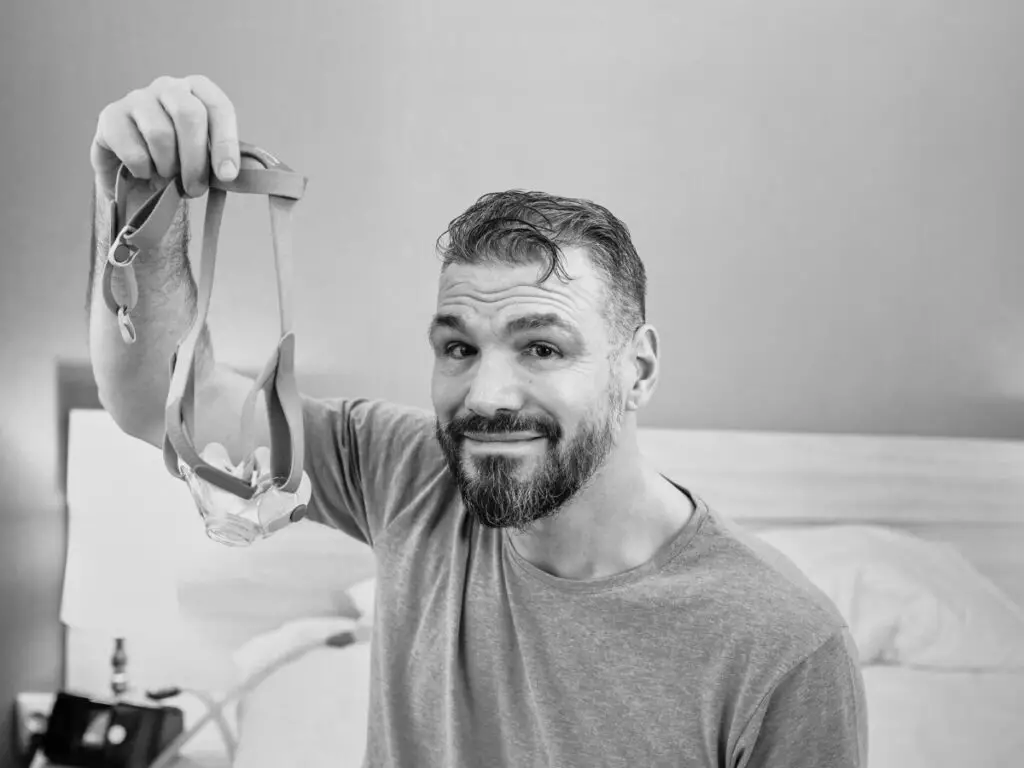
CPAP machines may last for up to 5 years; masks need more frequent replacements. If you’ve been using the same mask for up to 6 months, it could be causing heightened CPAP events per hour. Over time, the mask frame stretches, warps, and bends, compromising the fit.
What You Can Do
Consider replacing your CPAP mask. You’ll find different options on the market, and your preferences and comfort level determine the best type. Popular CPAP masks include the following:
- A full mask is triangular and fits over your mouth and nose. It is suitable for individuals who breathe through their mouths when sleeping. Besides, the doctor may recommend it if you experience nasal congestion.
- Nasal mask. This type of mask only covers your nose. Doctors typically recommend it to people who excessively move when sleeping.
- A nasal pillow mask only covers your nostrils. You may also find the option of prongs that fit into your nose. This type of mask is ideal for people who wear glasses.
Note that you cannot purchase a suitable mask unless the doctor identifies your unique sleep apnea symptoms. Once they do, they’ll recommend an ideal type that suits your treatment.
Drinking Alcohol Before Bed
A study reveals that alcohol consumption increases the risk of sleep apnea. Alcohol may relax your muscles after stress hours. While this sounds positive, relaxing throat muscles isn’t a good sign for patients with sleep apnea. The more your muscles relax, the higher the chance of collapsing your upper airway.
So, if you notice escalating CPAP events, alcohol is the culprit. It relaxes your muscles and increases the likelihood of more apnea events per hour.
What You Can Do
Avoid drinking before bedtime. Otherwise, you’ll only negatively impact your CPAP therapy.
Poor Sleeping Position
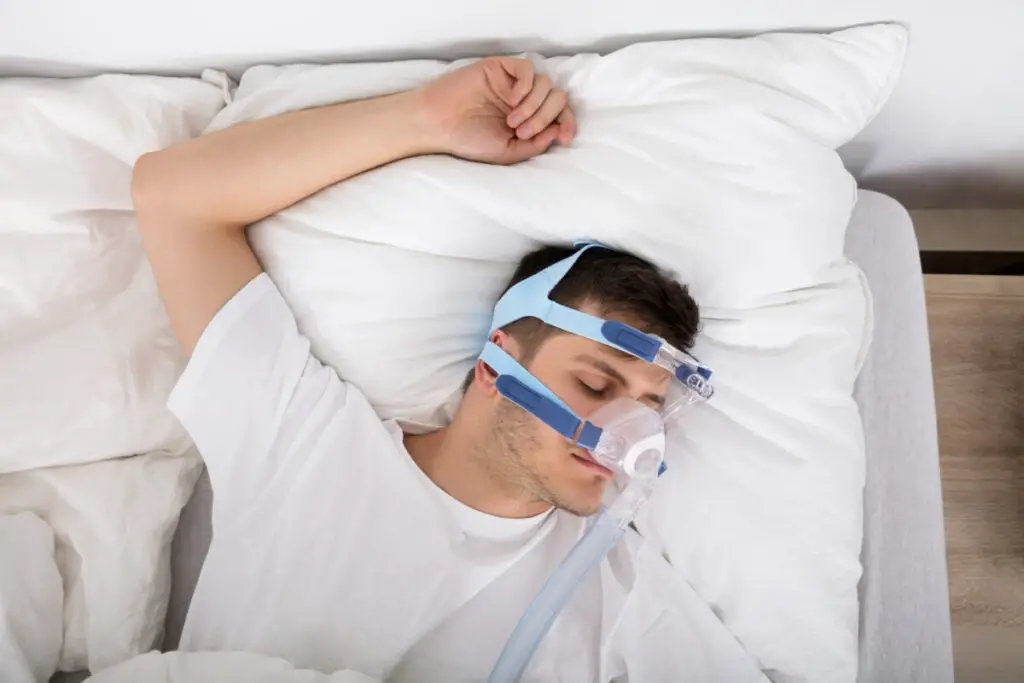
Your CPAP machine isn’t always to blame. In fact, how you sleep affects your therapy, too. If you sleep on your back, gravity will act against your airways, pulling against your soft tissues and increasing the AHI.
The MayoClinic experts declare sleeping on the back the worst sleeping position for sleep apnea patients. What’s more, Dr Lois Krahn, a sleep specialist at Mayo Clinic, mentions, “Sleeping on the back means that your tongue and jaw can fall down and crowd your airway. And many people snore more on their back.”
What You Can Do
You must adjust your sleeping position to decrease the CPA events per hour.
Dr Virend Somers, the director of the sleep facility within Mayo Clinic, says, “Sleeping on the side is better.” Dr Krahn adds to this by saying that sleeping on the side with a slightly tilted and elevated head is a better sleeping position.
This way, the machine won’t overwork to keep your airway open.
Mask Off Events
It isn’t uncommon for people to remove their masks when sleeping. This may happen consciously or unconsciously. If you do it intentionally, it may be related to the feeling of claustrophobia. Perhaps you feel suffocated or sense the mask is too tight. As such, you take it off to relax.
What to Do
Because mask-off events significantly affect your therapy and increase the events, you must take action to prevent them. Here are the possible steps you can take:
- Try wearing your CPAP mask during the naps to make yourself accustomed to it
- Go for a mask that has minimal contact with your skin – think a nasal mask. This will reduce irritation, mask anxiety, and allow you to wear it all night.
- Wear one during relaxing activities to get used to it. For instance, consider wearing it when reading a book or streaming a movie.
While the solutions mentioned above help, DO NOT forget to talk to your health practitioner. Let them know you take the mask off during sleep, affecting your CPAP therapy. They’ll guide you better about ways to minimize the events to take advantage of the therapy.
Worn Out Headgear or Mask Cushion
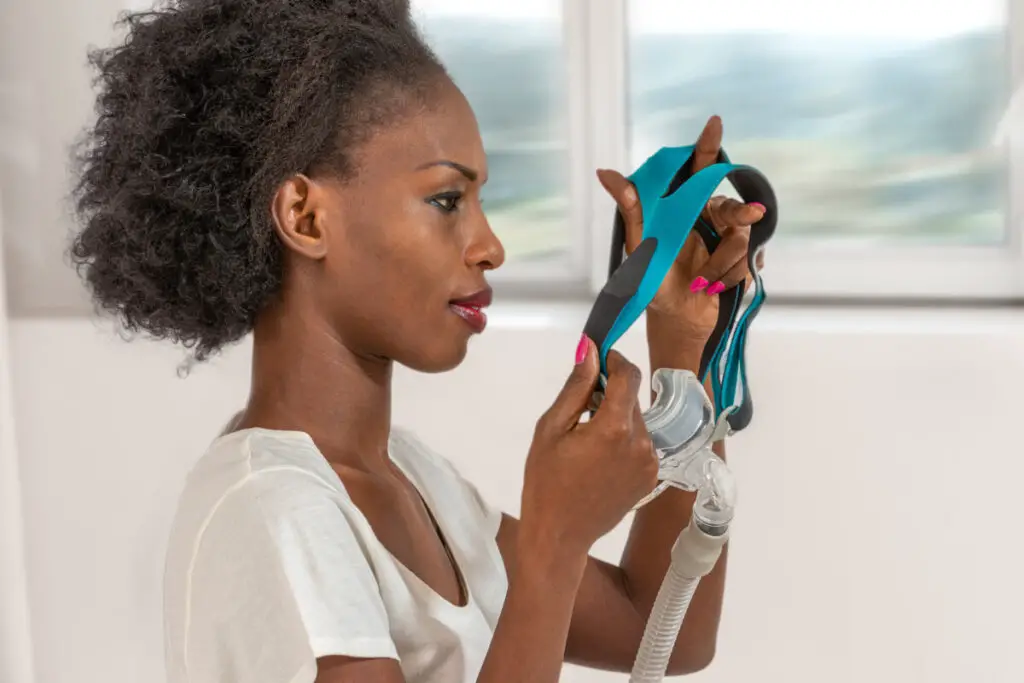
When was the last time you changed your headgear and cushion? If you haven’t replaced them in a long, perhaps they are causing more CPAP events per hour. Over time, the headgear stretches and loses elasticity, making the mask uncomfortable. Moreover, it loses its ability to create an adequate seal, compromising the air pressure.
What You Can Do
The only way to fix a worn-out mask headgear and cushion is to replace them. This will cut down the costs of investing in a brand-new mask. Besides, it’ll offer a better seal and reduce mask leaks. Plus, it will allow more air to enter your airway, lowering the CPAP events per hour.
Nasal Congestion
Nasal congestion leads to airflow velocity and resistance changes. It makes it difficult to breathe out of the nose when sleeping. As a result, it increases breathing events, including hypopnea, apnea, and snoring. Besides, nasal blockages also lead to mouth breathing, making CPAP therapy less effective.
What You Can Do
Here are a few ways to use CPAP with a blocked nose.
- Use a heated hose. Stuffiness typically occurs when your nose takes time to warm the hose air. However, a heated hose eliminates the trouble by providing humidity and minimizing stuffiness.
- Adjust the settings. You can add humidity or adjust the settings to add moisture to the dry air passing through your throat. This will make the therapy more effective and improve the comfort level.
- Go for a full face mask. A full face mask will allow you to breathe comfortably through your mouth if you have nasal congestion. Your CPAP therapist can guide you further about the best size and face mask type.
If nothing seems to work, consider taking:
- Flu medications to suppress cough and improve sleep
- Saline spray
- Nasal decongestants
However, consult your doctor before opting for any mentioned above treatment methods.
Wrong Pressure Settings
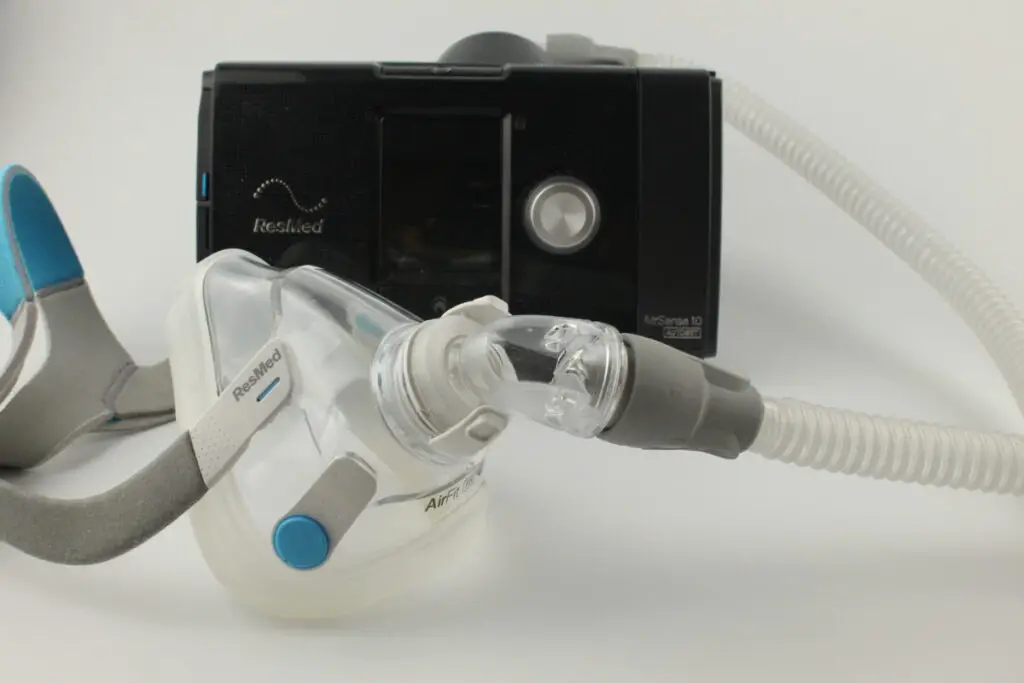
The CPAP pressure must be changed over time, especially with changes in weight or health. Inadequate pressure may lead to more CPAP events per hour. This explains why CPAP therapy specialists adjust it to optimal levels to improve your sleep quality and reduce sleep apnea symptoms.
What You Can Do
While adjusting the pressure is crucial to normalize CPAP events, you must never adjust one yourself. Instead, ask your healthcare professional to adjust the pressure settings.
Plentiful Air has more information on CPAP machines that are blowing too hard available here.
Mask Leak
A mask leak could also increase your CPAP events per hour. When the air escapes the mask, you do not get enough air pressure to keep the airway open. A mouth leak, improper cleaning, and a poorly fitted mask are three reasons that may cause a mask to leak. Further, it is also common if you use nasal pillows or masks or breathe through your mouth.
What You Can Do
Here’s what you can do about a mask leak and reduce the CPAP events to the normal level.
- Clean the mask. Use a baby shampoo or a gentle soap to wash the mask cushion and remove the trapped bacteria and dirt. Besides, consider washing the entire mask with mild soap weekly.
- Make adjustments. Because a poorly fitted mask can also lead to leaks, consider trying one in the therapist’s office. They’ll help you make appropriate adjustments. Further, people often try their masks while standing or sitting and notice a fitting change once in bed. So, try lying down after wearing the mask to confirm the correct fitting.
- Try another mask type. Mouth leaks are common in people who breathe from their mouths when sleeping. You can fix it by wearing a chin strap. However, if it’s too uncomfortable, replace your mask with a full face mask. You’ll find several lighter and more comfortable models on the market.
Complex Sleep Apnea
More events per hour could also indicate complex sleep apnea. So, while the device works to treat your apneas, your brain may fail to alert your body to breathe. This is typically called central sleep apnea, which leads to a dysfunction in the central nervous system. Fortunately, many newer CPAP models inform you about central apneas.
What You Can Do
You must consult your doctor if you’re dealing with complex sleep apnea. They might recommend medications or alternative treatment methods to benefit from CPAP therapy.
If you are also concerned that your CPAP has lost pressure, Plentiful Air has a complete troubleshooting guide available here.
How Do I Reduce Event Per Hour On My CPAP?
The CPAP events per hour can be reduced by replacing your CPAP mask, changing your sleeping position, avoiding alcohol before bed, and preventing mask leaks.
High CPAP per hour events indicate you’re not getting the most out of your therapy. You must reduce these events to make the treatment as effective as possible.
A worn-out mask would fail to function adequately. Make sure you replace it and buy one from a renowned CPAP mask brand.
Avoid sleeping on your back and cut down any habit of drinking before bed. The wrong sleeping position can also block your airway, and alcohol before bed can collapse the air passage, affecting your treatment.
Always fit the mask properly, clean it, and overcome mouth leaks if you notice mask leaks. All these hacks will alleviate your sleep apnea symptoms and reduce the number of events per hour.
How Many CPAP Events Per Hour Are Normal?
Four (4) CPAP events per hour are considered normal. Anything more than that is characterized as mild to moderate sleep apnea.
If you experience 5 or more events per hour, you must take steps to reduce them. Alternatively, consult your CPAP therapist and inform them about the number of events to learn more about your health condition.
What Is a Good AHI Number With CPAP?
Anything less than 5 is considered a good AHI (Apnea-Hypopnea index) number. A higher number indicates more severe sleep apnea.
Here’s a quick guideline about AHI numbers.
- Normal. This indicates less than 5 events per hour.
- Mild sleep apnea. You have mild sleep apnea if you experience 5 to 15 events per hour. This means your therapy needs improvements to drop the CPAP events to normal levels.
- Moderate. Patients with moderate sleep apnea experience 15-30 events per hour. The high AHI number signifies your therapy isn’t going well. Change your equipment or ask your therapist to adjust the settings.
- Severe. You have severe sleep apnea if you encounter 30 or more events per hour. This indicates your CPAP therapy isn’t working, and you must talk to your doctor to know the next steps.
How to Know If I’m Allergic to My CPAP Mask and What to Do About It?
If you notice skin irritation or a bruise after wearing a CPAP mask, you may be allergic to it. Keeping your mask clean and choosing specific mask types can alleviate the symptoms.
Here are some tips to know if you’re allergic to the CPAP mask:
- You must stop wearing a CPAP mask if you encounter an allergic reaction the same night you wear one. Contact your therapist and inform them about the problem.
- You may experience an allergic reaction due to infrequent mask cleaning. So, if you haven’t cleaned your mask in a week and the mask irritates your skin, an allergic reaction has occurred.
- Finally, if a latex-made CPAP mask caused you a bruise, it could be an allergic reaction. Consider buying one made of silicone or other gel material.
If nothing seems to work out, visit a skin specialist to seek treatment.
